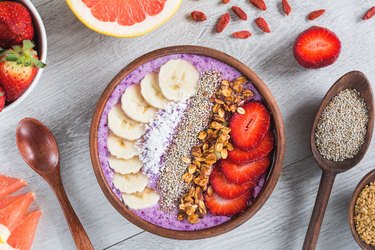
I was recently talking with a group of fit, nutrition-oriented guys. These guys lifted heavy, ate clean, supplemented smartly, and got seven to nine hours of sleep every night. Yet a few of them lamented that ditching their stubborn midsection fat had become more difficult as they grew older.
Inevitably, intermittent fasting came up. Most of the guys in this group swore by it, and as a few waxed poetically about its numerous benefits, I saw a frustrated look on one man's face. I asked him why.
Video of the Day
Video of the Day
"I'm incredibly disciplined, but every time I try intermittent fasting, I become a monster." he said. "I'm so hungry — I snap at people for no reason, and I can't think clearly. I can never stick with it very long because of those damn hunger pangs."
The other guys assured him that over time his ravishing hunger would subside. He didn't seem entirely convinced.
I know how debilitating hunger can be. I tell people to eat every four to six hours for several reasons: to balance blood sugar levels, of course, but yes going long without eating can make most people turn into monsters.
I certainly do. If I go longer than six hours without eating, I'm not exactly pleasant to be around. I can't think clearly, I'm more prone to mood swings and food becomes the pink elephant in the room that I can't avoid.
So I get it: intermittent fasting can become a real challenge.
As your body adapts, it does become easier. I've found these tools — (which are completely accepted within most forms of intermittent fasting) — can make the transition easier to curb hunger and cravings:
1. Green Tea
I sip green tea all day for its thermogenic (fat-burning) effects and its calming amino acid theanine. Green tea can also curb your appetite thanks to epigallocatechin gallate (EGCG), which increases your hormone cholecystokinin (CCK) that signals your brain you're satiated.
2. Medium-Chain Triglycerides
Most forms of intermittent fasting allow medium-chain triglycerides (MCTs) because your body burns them for energy rather than stores these fatty acids. MCTs also increase ketone production and improve satiety. One study showed MCTs could increase your metabolic rate up to 12%. I add MCTs to my morning organic coffee for an all-morning fat-burning kick.
3. Branched-Chain Amino Acids
Fitness buffs have long sworn by the branched-chain amino acids (BCAAs) leucine, isoleucine, and valine. Turn out they can also make intermittent fasting easier. "BCAA have special actions in regulating energy, controlling hunger, and potentially benefiting stress induced cravings," write Drs. Jade and Keoni Teta, authors of The Metabolic Effect Diet_._ You'll find BCAAs in capsules or powder forms.
4. Water
Hunger sometimes signals dehydration, and a glass of filtered water might be your ticket to stifle a growling stomach. For instance, a study at the University of Washington found drinking eight ounces of water at bedtime could shut down your evening hunger pangs. I keep a stainless steel canteen and sip throughout the day. Ideally, aim for half your body weight in ounces of water, so if you weigh 140 pounds, try to drink 70 ounces of water per day.
5. Fiber
Fiber is my go-to for curbing cravings and appetite as well as balancing blood sugar. Mix a teaspoon or two of a fiber-supplement powder with water and watch your appetite dissolve. A study in the European Journal of Nutrition found that fiber in beverages could enhance perceived satiety and decrease the desire to eat more than a beverage without fiber. Start slowly supplementing with fiber powder (too much at once can cause cramping and, uh, bathroom issues), and drink plenty of water as you increase fiber intake.
Is this an emergency? If you are experiencing serious medical symptoms, please see the National Library of Medicine’s list of signs you need emergency medical attention or call 911.